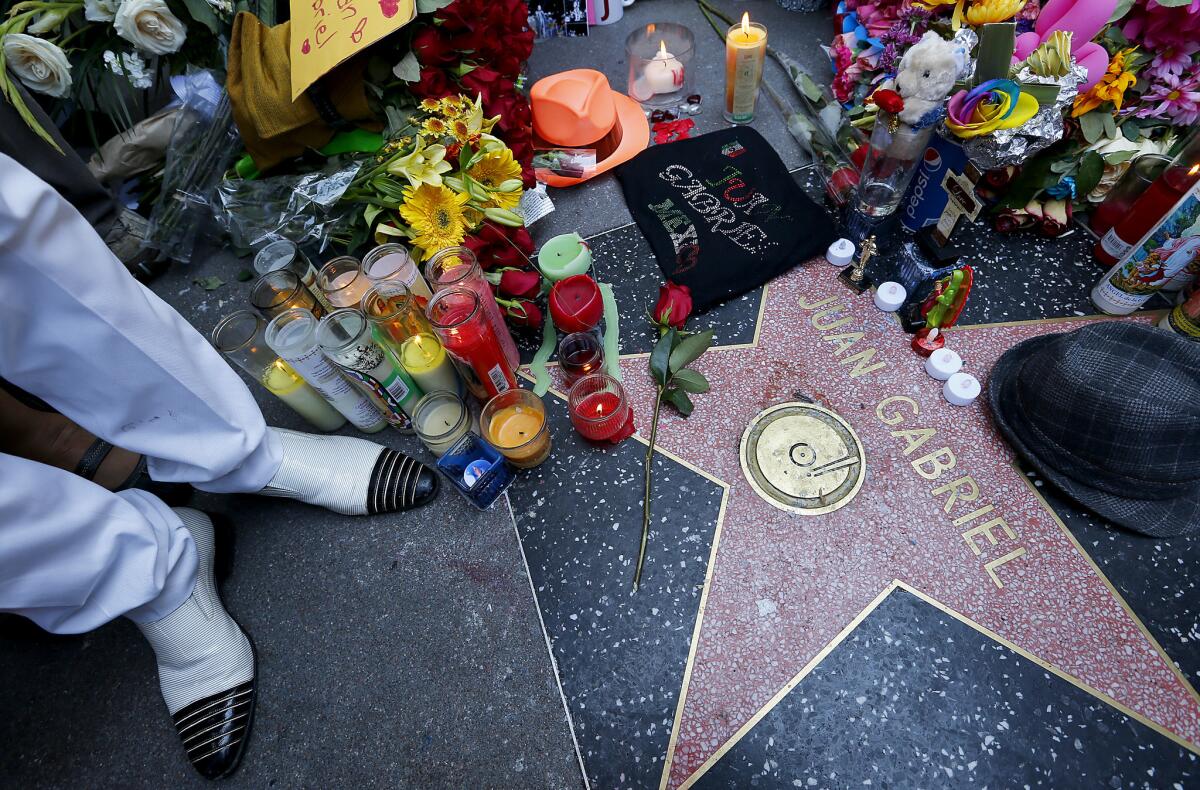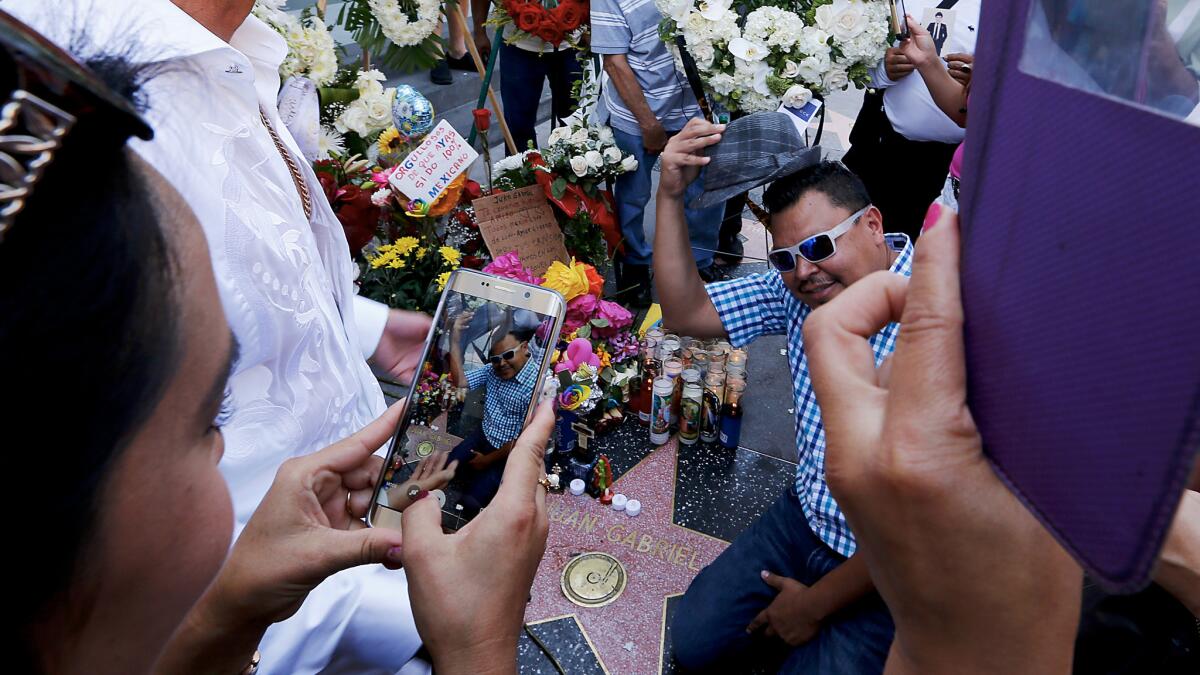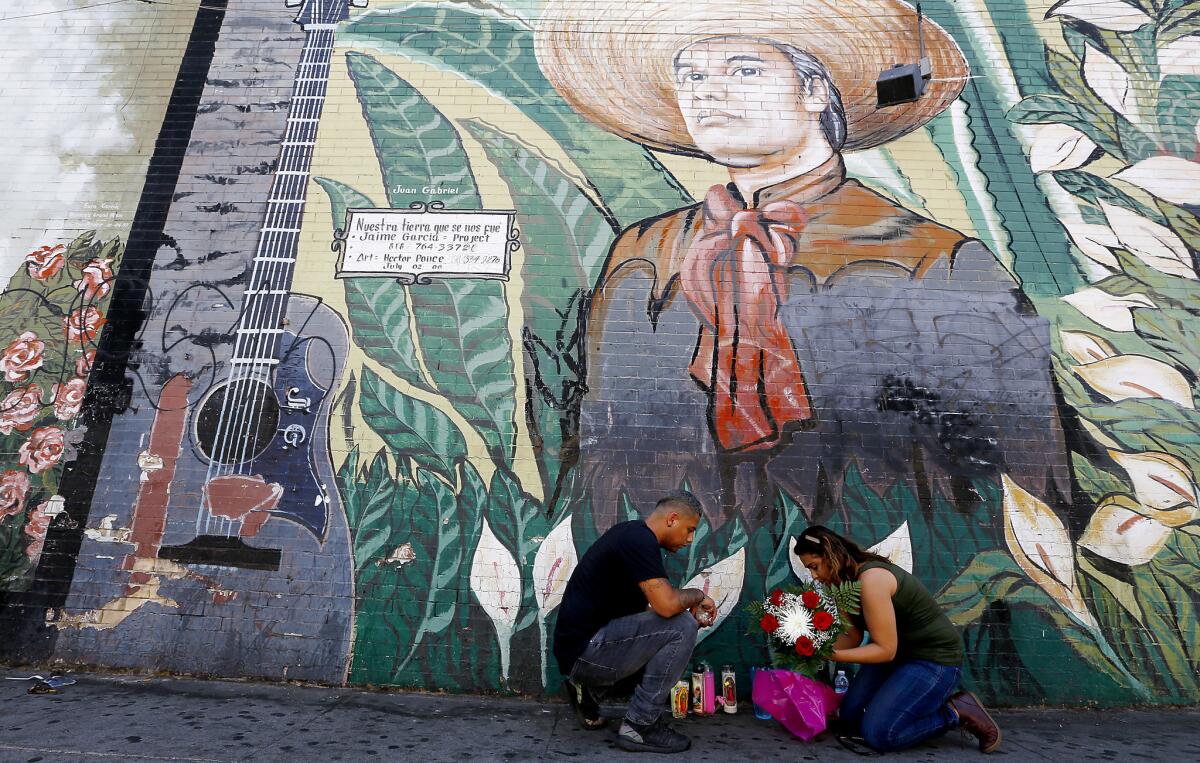To his fans, Juan Gabriel was their ‘godfather,’ their family, their home

- Share via
Nancy Cortes learned two things growing up: Respect your mother. And respect your mother’s love for Juan Gabriel.
Her family woke up to the Mexican singer’s smooth, raspy voice every morning, his love ballads playing on a loop. To badmouth Juan Gabriel was to risk punishment by shoe.
“Nobody could mess with his name or image because you would get threatened with the chancla,” said Cortes, 34.
On Monday, the Long Beach resident, along with countless fans across the United States, Latin America and beyond, woke up heartbroken.
Then, shaking off the dirge of sadness, they blasted his classics -- the joyous and the sad -- from body shops and beauty shops to panaderias and the 5 Freeway. They glued themselves to Spanish television, watching marathon coverage of the legend’s life and concerts. Men, with voices down to a whisper, called to express their sorrow on the radio. At the singer’s star on the Hollywood Walk of Fame, fans gathered, holding each other as they swayed to his music.

They struggled to convey what they found so essential about a man some had never heard of.
The entertainer and composer transcended generations, geographic boundaries and class. His flamboyant showmanship provoked constant intrigue in a macho-driven culture that learned to love him.
Over four decades, Juan Gabriel’s songs became the soundtrack to weddings, quinceañeras, first loves and funerals. He represented their mother, their childhood, their Mexico.
“He was like a godfather,” said Leticia Vasquez, 47. “Always there, on the most guttural level, telling you, it’s OK to cry.”
In recent years, time was starting to catch up to the one they lovingly called JuanGa. His hair thinned, his waist grew more ample and his feet, now and then, wobbled as he gyrated onstage. When he postponed his American tour two years ago, fans whispered: Did he still have it?
On Friday, the best-selling singer in Mexican history took the stage at the Forum in Inglewood, to prove, as he’d done many times before, that he remained the ultimate showman.
***

The candles had begun to melt over Juan Gabriel’s makeshift memorial by the time Maria Navarro arrived with her daughter, Yoena Venegas. Unsure where else to go, the fans flocked here, to his star on the Hollywood Walk of Fame
They drove from Fullerton, well before sunrise and without any sleep, to bid farewell to a singer Navarro, 50, learned to adore in her youth.
One of his greatest hits, “Amor Eterno” (Eternal Love) always brought her to tears. It reminded her of her mother, who died when she was 8 and of her father, who was gunned down in Jalisco when she was 16.
“If anyone knew how I felt, it was going to be him,” Navarro said of Juan Gabriel, who was sent to an orphanage at an early age. “I really miss them.”
Growing up, Venegas never understood why her mother listened to the singer so often, as she cleaned and cooked. Her tears were a childhood mystery.
Then, three years ago, Venegas’ paternal grandmother died. At her funeral, her father played “Amor Eterno.” Everyone crumpled in tears.
The lyrics, for Venegas, finally struck a chord.
Como quisiera que tu vivieras,
Que tus ojitos jamás se hubieran cerrado nunca
(How I wish that you lived,
that your eyes never would have closed)
As the sun began to rise, the two women stood a few feet from the memorial and softly wept.
***
As a kid in the Central Valley, Leticia Vasquez, wanted to listen to Madonna and Prince, not the love songs of Juan Gabriel her parents preferred.
“I thought it was so embarrassing, so cheesy,” she said.
Then at 16, for the first time, she fell in love.
His name was Paul — tall, dark and with big, beautiful lips.
“Everyone told me to get away from him, but I didn’t listen,” Vasquez said.
The romance lasted one month. Not bad by high school standards. But she found out that Paul had been cheating on her the entire time.
Vasquez barricaded herself in her room and turned on her boombox. This was a moment, it seemed, only Juan Gabriel could understand.
“He got me on such a visceral, emotional level,” she said. “I realized Madonna was my public persona. Juan Gabriel was me behind closed doors.”
Later in life, JuanGa’s songs became anthems for every milestone: To Paul she dedicated “La Farsante” (The Phony); to her husband “Me Nace del Corazon” (Born from My Heart), and to her sons “Abrazame Muy Fuerte” (Hug Me Hard.)
Vasquez now lives in Amsterdam, far from Madera High School, the place of her first heartbreak. She’s a lawyer who gladly tortures her children with Juan Gabriel’s songs.
“They hate it,” she said. “But I know … I know the cycle.”
***
Jorge Gutierrez was about age 7 and living in Nayarit, Mexico, when he first saw Juan Gabriel on television. The way he moved and whirled. His sequin-drowned outfits. The coquettish flip of his head before launching into one of his songs.
“I’m like him,” Gutierrez whispered to himself at the time.
Juan Gabriel didn’t discuss his sexuality publicly, but some saw in him a trailblazer. Growing up in the small town of El Cora, the singer “validated my queerness,” said Gutierrez, 32.
“He challenged the homophobia and sexism in his own culture and made everyone fall in love with his music and poetry.”
Gutierrez, who now lives in Los Angeles, remembers anxiously watching a famous interview in 2002 when the musician was asked directly whether he was gay.
Juan Gabriel’s response: “Dicen que lo que se ve no se pregunta, mijo”
“They say what you see, you don’t ask about, son.”
Gutierrez was satisfied with the answer.
“It was such a powerful moment,” he said. “He was reclaiming the question. We don’t always have to come out to please others.”
He said many Latino gay friends have a complicated relationship with their families.
Still, even in homes with deep-rooted homophobia, Juan Gabriel’s music was able to break through the macho Latino culture.
At Gutierrez’s family gatherings, everyone sang to Juan Gabriel’s songs. It’s the same for his friends too.
“For queer people,” he said, “it’s almost like we were coming out every time we sang one of his songs.”
***
Jose Lara of Pico Rivera grew up grew up listening to Tupac and Snoop Dogg. It was the height of the West Coast hip-hop scene, and he was a teenage Chicano “trying to find his way in the world.”
The 35-year-old is first generation Mexican American. Half his family still lives in Tijuana.
It was Juan Gabriel who rooted him, brought him home and gave him a sense of belonging in a way that American rappers never could.
“It reminded me of my Mexican-ness, of love and hope,” Lara said. “It would be the music that connected me to my family in Mexico and the older generation living in the U.S. too.”
Juan Gabriel’s music created a bridge that connected him with his uncles, tias and parents who perhaps shared a different sort of American experience than he did.
It was the same at school.
Many of his first-generation Latino friends at Valencia High School in Placentia listened to different English-language musicians—from the Pixies, Nirvana to Tupac.
But Juan Gabriel unified them.
“When Juan Gabriel came on,” he said, “we all spoke the same language.”
***
Guadalupe Gallardo was age 13 when she left her native Michoacan for Los Angeles.
She lived with an aunt and got a job as a waitress. The big city was so different that she struggled with home sickness.
One day, she heard a familiar voice on the radio: It was Juan Gabriel.
For the first time in a long time, she felt happy. His music, if only for a moment, took her back to Mexico. To tending the corn fields with her father, preparing tortillas for lunch and helping her mother clean the house.
“I felt nostalgic,” said Gallardo, who now runs a stand on Olvera Street.
“My family was back home, and I had never separated from them, and it felt terrible without them.”
For as long as the 48-year-old can remember, she’s loved Juan Gabriel’s music and respected him as person.
“Sometimes you hear a song and it makes you sad,” she said. “Sometimes you hear a song that makes you dance, and sometimes you hear a song that makes you take a little shot of tequila.”
Above all else, she appreciated his pride for Mexico.
“He was always Mexican,” she said. “No matter where he traveled.”
ALSO
Mexico mourns Juan Gabriel, the singer known as ‘El Divo de Juarez’
Juan Gabriel was Mexico’s gay icon, but he never spoke of his sexuality
Op-Ed: As a boy, I was taught to ridicule Juan Gabriel. As an adult, I revered him
More to Read
Sign up for Essential California
The most important California stories and recommendations in your inbox every morning.
You may occasionally receive promotional content from the Los Angeles Times.













